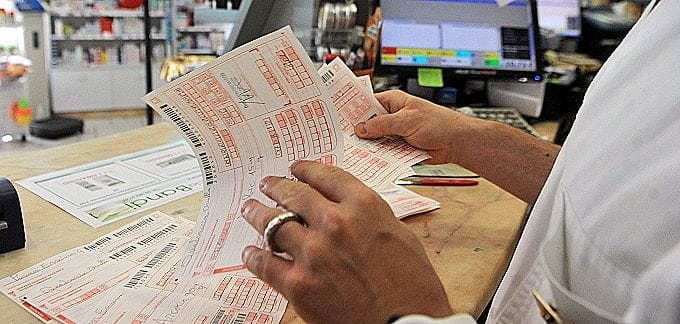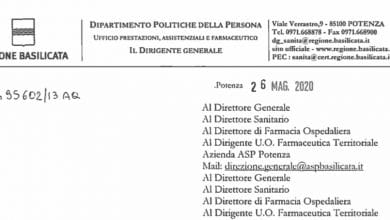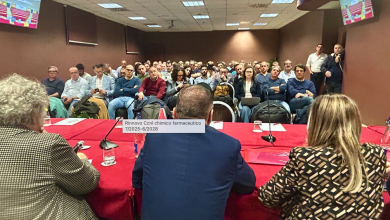
Friday, October 31, 2014, – Doctor33
 The doctor's prescription left in the envelope on the table in the waiting room? We may never see her again. The Guardia di Finanza is intensifying checks on health facilities to verify compliance with the rules on confidentiality, and in Liguria it has sanctioned family doctors, for prescriptions not delivered to patients by hand, but left at the mercy of the "attenders".
The doctor's prescription left in the envelope on the table in the waiting room? We may never see her again. The Guardia di Finanza is intensifying checks on health facilities to verify compliance with the rules on confidentiality, and in Liguria it has sanctioned family doctors, for prescriptions not delivered to patients by hand, but left at the mercy of the "attenders".
In one case, the doctor would have left the prescriptions delivered to the pharmacy and here, in addition to configuring a possible economic relationship between the two professionals, we enter the field of data communication to a non-entitled person, an act that could also be relevant in terms of deontological, and that the Privacy Code of 2003 sanctioned with fines of several tens of thousands of euro.
Paola Ferrari lawyer, active for years in the defense of family doctors, has prepared a handbook (The importance of data processing in the study of GPs) with Frequently Asked Questions and suggestions read in hand. «The omission of the security measures is one of the reasons why the visit of the GdF can create problems to a doctor who has not yet complied with the Code.
The other frequent reason for the sanction – observes Ferrari – is the failure to post the sign with the information required by art. 13 of the code. Finally, there are the abandonment of documentation in visible places and the lack of confidentiality of conversations".
In general, the GdF visit, continues Ferrari, "is aimed at verifying that patients know who is processing their data and that the study collaborators "in charge" of managing this data have letters of appointment and if the doctor has taken care of give specific indications of security and non-usability of the data managed by external companies that provide cloud services".
To go back to issuing prescriptions, they must be delivered to the patient concerned or to a person in charge with a proxy. Article 31 of the Code in fact requires the protection of sensitive data from loss and unauthorized access. Enabling anyone to take an envelope that is not theirs, even if only for distraction, is a violation".
Any other rules to follow? «Soundproof the rooms, to prevent someone from listening to health information deriving from the doctor conversation from the waiting room. In particular, it is essential that the staff know that they must never communicate pathologies or information, even by telephone, to people other than the patient who has the right to the confidentiality of his information".
Mauro Miserendino
Related news: Privacy and prescriptions, doctors in the crosshairs
________________________________________________________________
 Warnings for ISFs: Sometimes it happens that the doctor receives the Informant together with one or more patients. Under these conditions, the ISF cannot provide scientific information: il Legislative Decree 219/06 in fact it says in the art. 119 that "the healthcare operators to whom information about a medicinal product can be addressed are exclusively those authorized to prescribe or dispense it”, and the patient who attends the information is usually not a healthcare professional.
Warnings for ISFs: Sometimes it happens that the doctor receives the Informant together with one or more patients. Under these conditions, the ISF cannot provide scientific information: il Legislative Decree 219/06 in fact it says in the art. 119 that "the healthcare operators to whom information about a medicinal product can be addressed are exclusively those authorized to prescribe or dispense it”, and the patient who attends the information is usually not a healthcare professional.
Information to pharmacists of medicines that can be sold on presentation of a medical prescription is limited to the information contained in the summary of the characteristics of the medicine. The limitation does not apply to hospital pharmacists.
It is therefore excluded that a patient or in any case a person who is not a healthcare professional can assist and listen to what a Scientific Representative says in the performance of his work.
If the promotional information to healthcare professionals is carried out in violation of the provisions and criteria and directives, the Medicines Agency (AIFA):
a) orders the immediate cessation or suspension of the promotional information;
b) orders the dissemination, at the offender's expense, of a correction and clarification press release, the drafting of which will be handled according to the methods established by AIFA. This press release may be inserted by AIFA in the Bulletin of information on drugs and on the institutional website of the same and, by and at the expense of the Company, on the latter's website or even in national newspapers.





